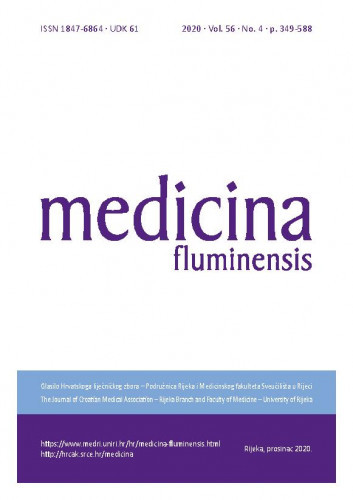Transplantacija organa jedna je od najvećih pozitivnih tekovina 20. stoljeća. Pionirsku ulogu u liječenju kroničnog zatajivanja bubrega u Hrvatskoj odigrala je Kirurška klinika KBC-a Rijeka uz suradnju s imunolozima, nefrolozima, transfuziolozima i brojnim drugim specijalistima. Prva hemodijaliza u pacijenata s akutnim bubrežnim zatajivanjem učinjena je 1962. godine. U listopadu 1966. počela je redovita hemodijaliza pod vodstvom prof. dr. Jerka Zeca. To je bila osnova za program transplantacije bubrega. Ostale pripreme pod vodstvom prof. dr. Vinka Frančiškovića provodile su se tijekom nekoliko godina. Na psima smo učili operativnu tehniku transplantacije. Izučavanje kliničkih i imunoloških problema odvijalo se u okviru transplantacijske sekcije. Autor ovog teksta proveo je prvu polovicu 1969. godine na Nefrološkoj klinici pariške bolnice „Necker“ pod vodstvom prof. J. Hamburgera. U dogovoru s kirurgom Michelom Lacombom prisustvovao je i prof. Frančišković jednoj transplantaciji od živog darivatelja. Temeljite su pripreme rezultirale prvom transplantacijom bubrega 30. siječnja 1971. godine. Majčin bubreg presađen je 34-godišnjem pacijentu. Pacijent je umro 14,5 godina kasnije s funkcionirajućim bubregom. Prvi bubreg umrle osobe presađen je 15. svibnja 1972. godine. Darivatelj je bila žena čija je smrt utvrđena na temelju zastoja srca. Pacijent je umro šest mjeseci kasnije od milijarne tuberkuloze. Usprkos želji da se što više koristi umrla osoba kao darivatelj, tijekom dugog razdoblja veći dio naše aktivnosti činile su transplantacije od živog darivatelja, zbog pritiska mnogih pacijenata iz drugih krajeva Hrvatske i ostalih republika bivše države. Mali broj bubrega od umrle osobe davali smo pacijentima na listi čekanja prema pravilima odabira. Tako je, primjerice, više od 20 pacijenata iz Slovenije dobilo bubreg u Rijeci. Nesebično smo pomagali i ostalim centrima u početku njihove transplantacijske aktivnosti.; Organ transplantation is one of the greatest achievements of the 20th century. In Croatia the pioneering role in the treatment of end-stage renal disease was done by Department of Surgery in the Clinical Hospital Rijeka which cooperated closely with immunologists, nephrologists, transfusiologists and other specialists. The first hemodialysis in patient with acute renal insufficiency was done in 1962. The chronic dialysis began in October 1966 under the leadership of prof. Jerko Zec. Establishement of the dialysis was the basis for the program of kidney transplantation. The other preparations during several years were under leadership of prof. Vinko Frančišković. We learned the operative technics on dogs. Clinical and immunological problems were debated on regularly meetings. The author of this text stayed the first six months in 1969 at the Department of Nephrology in „Necker“ hospital in Paris. He arranged with the transplant surgeon Michel Lacombe a visit of professor Frančišković to Paris to see a kidney transplantation from living donor. Solid preparations resulted in the first kidney transplantation performed at the January 30th 1971. The mother gave her kidney to 34-year old son. The recipient died 14,5 year after transplantation with functional transplant. The first cadaveric transplantion was performed at the May 15th 1972. The donor was a woman injured in traffic accident. The diagnosis of death was based on cardiac arrest. The patient died after 6 months from miliary tuberculosis. Contrary to our wish to use cadaveric donor as much as possible, during many years we performed more transplants from living donor due to pressure of many patients from other regions of Croatia and others republics of Yugoslavia. Small number of cadaveric kidneys we gave to patients on waiting list toward rules of selection. For example, more than 20 patients from Slovenia received new kidney in Rijeka.
Sažetak
Dio od

 Medicina Fluminensis : glasilo Hrvatskog liječničkog zbora - Podružnica Rijeka i Medicinskog fakulteta Sveučilišta u Rijeci = the journal of Croatian Medical Association - Rijeka Branch and Faculty of Medicine - University of Rijeka : 56,4(2020) / glavni i odgovorni urednik, editor-in-chief Saša Ostojić.
Medicina Fluminensis : glasilo Hrvatskog liječničkog zbora - Podružnica Rijeka i Medicinskog fakulteta Sveučilišta u Rijeci = the journal of Croatian Medical Association - Rijeka Branch and Faculty of Medicine - University of Rijeka : 56,4(2020) / glavni i odgovorni urednik, editor-in-chief Saša Ostojić.